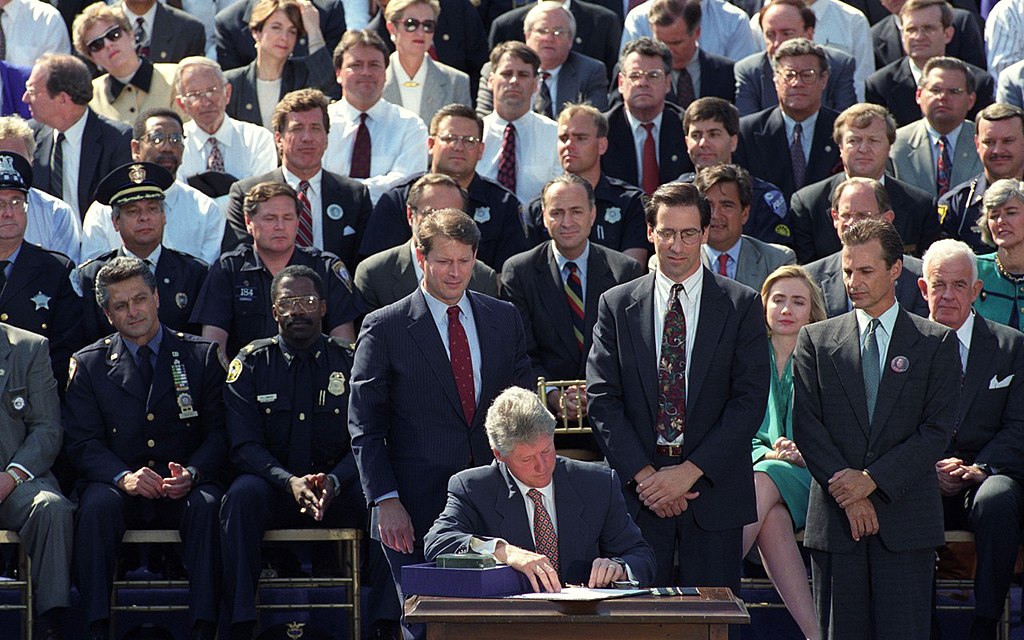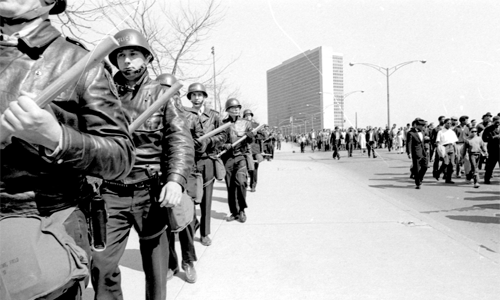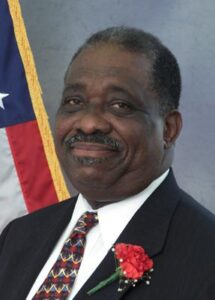
President Bill Clinton signs the Violent Crime Control and Law Enforcement Act into law, 13 September 1994. (Photo: US Government Printing Office)
The Violent Crime Control and Law Enforcement Act of 1994 (PL 103-322) permitted the federal government to take civil action against government authorities that have demonstrated patterns and practices that deprive people of their constitutional rights.
The death of Mr. Jerry Jackson on April 6, 1995. Shot in a tunnel with 13 unauthorized Black Talon bullets by John Charmo, a Pittsburgh Housing Authority Police Officer. Mr. Jackson was African American; Mr. Charmo was White. The Pittsburgh Bureau of Police was responsible for the investigation. A cover-up was suspected and evidence seemed to corroborate those suspicions. The case was not prosecuted until 1999 and the shooter was permitted to plea and was released after being held for only 11 months.
The death of Mr. Jonny Gammage at the hands of Baldwin Borough police officers on October 12, 1995. Mr. Gammage was a young man (African American) driving an expensive car through a predominately white suburban area at night.
Brentwood police initiated a traffic stop which ultimately occurred just inside the limits of Pittsburgh. Following a hostile encounter, Mr. Gammage was restrained face-down on the ground by police officers applying pressure on his neck and his back which caused chest compression incompatible with breathing. Mr. Gammage died at the scene.
Three officers were charged with involuntary manslaughter. On October 15, 1996, two of the officers went to trial. On October 18th, a mistrial was declared following testimony from the Coroner in which one of the defendants was challenged to take the stand and explain his actions. A second trial was declared a mistrial and charges were dropped.
The third officer went to trial on November 4, 1996. On November 13th this officer was found not guilty of involuntary manslaughter. In 1999, the U.S. Department of Justice declined to file civil rights charges against the officers.
This incident gained national attention and served as a catalyst for activism by the federal and local governments.
A catalyst for Activism
In March 1996, PA State Representative Bill Robinson requested the U.S. Department of Justice to investigate the alleged brutality of the Pittsburgh Bureau of Police.
On March 27, 1996, the ACLU filed a class action suit on behalf of numerous individual and organizational complainants against the City of Pittsburgh, the Bureau of Police and several individuals associated with the municipal defendant. Among the allegations were violations of First Amendment rights to question police conduct; false arrests and imprisonment; unlawful and unreasonable searched & seizures (especially in African American neighborhoods); and the use of excessive force. (Williams v. City of Pittsburgh, CA-96-560 (WDPa., Cindrich, J.)).
In April 1996, the U.S. Department of Justice opened an investigation into the policies and practices of the Pittsburgh Bureau of Police. The authority to do so emanated from the Violent Crime Control and Law Enforcement Act of 1994 (PL 103-322).
On April 9, 1996, City Councilman Sala Udin called for the creation of a civilian review board. Council delays any action pending review of the Williams lawsuit.
Mayor Murphy appointed Robert W. McNeilly, Jr. as Chief of Police. The Chief, a 19 year-veteran of the PBP, offered a robust agenda of reform and accountability designed to improve the relationship between police officers and the community.




